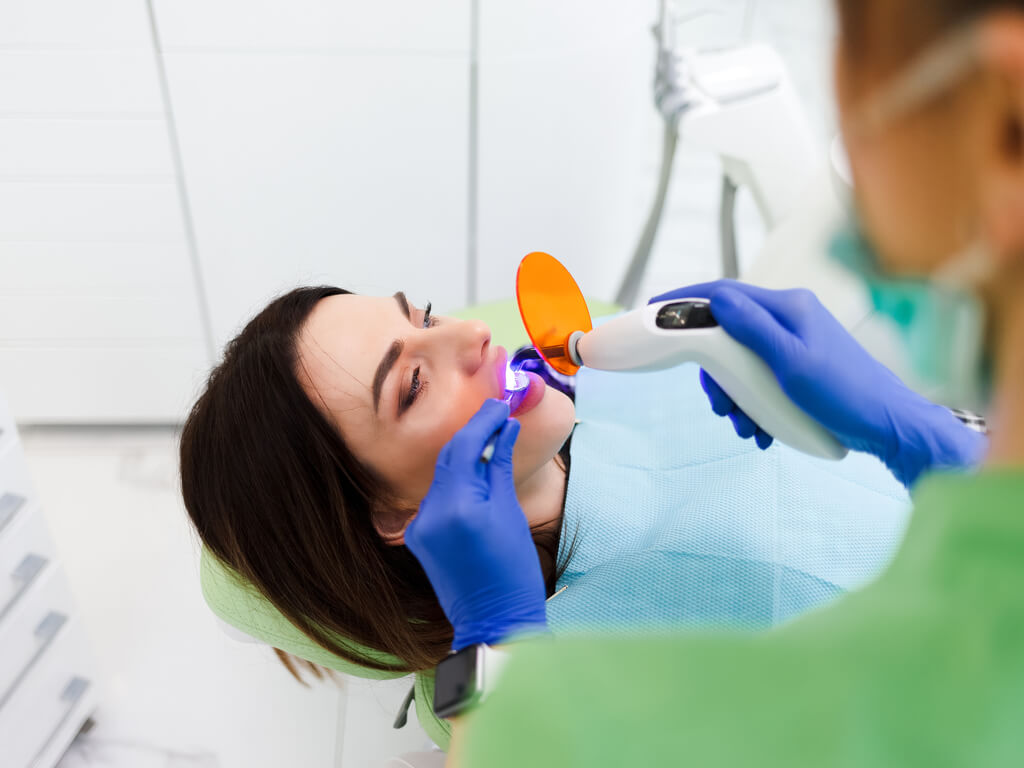DENTAL BONDING

Dental bonding is a restorative dental procedure used to repair teeth that are chipped, cracked or discolored. Dental bonding is a popular alternative to dental veneers, dental crowns, and tooth extractions.
How does dental bonding work?
Bonding is a procedure in which a tooth colored resin is applied to a damaged tooth. Front teeth are one of the most common repairs performed with dental bonding.
At the beginning of the procedure, your dentist will color match your teeth with the appropriate resin. Next, the tooth is lightly prepped with a handpiece to rough up the surface of the enamel. This is done to ensure that the resin can properly bond with the chipped tooth.
Next, a bonding adhesive will be applied to the surface of the tooth. Once the adhesive sets, the plastic resin is applied and sculpted into the desired shape by the dentist.
The resin is then cured with a handheld UV light for a few minutes. Once set, the resin is trimmed, smoothed, and polished to a natural appearance.
Altogether, the procedure usually takes about 30 to 60 minutes to perform properly.
Considerations for Getting A Tooth Bonded
The bonding procedure can often be completed in a single office visit and can significantly improve the appearance of a tooth. However, since the plastic resin used is not as strong as your natural tooth enamel, it is more likely to stain, chip, or break when compared to your natural teeth.
When Should I Get A Tooth Bonded?
This treatment has many applications, depending on the condition of your teeth. If your teeth have minor defects or chips, tooth bonding is a quick and easy solution. Bonding can also improve the color of your teeth when you don’t need full bleaching or whitening treatment.
Another use for bonding is improving the spacing between your teeth. If you have a tooth that seems to be a little too far apart from an adjacent tooth, bonding can fill in that gap and complete your perfect smile. Which is a good option if you would rather avoid braces.
Bonding can even repair minor cases of tooth decay. However, you should always ask your dentist about the best treatments for your teeth, because no one tooth is the same!
How long does bonding last?
Bonding typically lasts three to five years before they need repair. The quality of the work, as well as your own oral hygiene habits, also influences how long the bond will last. If your dentist does an excellent job, and you take care of your teeth, the bonding material can last up to 10 years.
As with veneers, it is highly recommended to be very careful with bonding and a night guard is encouraged.
How do you care for bonded teeth?
Essentially, you care for a bonded tooth the same way are your natural teeth. Regular brushing and flossing will reduce staining and discoloration. You should avoid eating and drinking foods that will stain your teeth like coffee and red wine and even foods with strong food dyes. If the bond does get stained, look for a toothpaste that removes surface stains.
If you play sports or are prone to teeth grinding, you should use a mouth guard to protect the bond and your natural teeth.
What if I have multiple teeth that need repairs?
If you have several teeth that need repair or color improvement, you may want to ask about getting a porcelain veneer.
As mentioned above, veneers are porcelain dental implants that sit on top of your teeth. They are customized to each patient and can help you achieve the perfect smile. The porcelain material used in veneers can last up to 20 years if cared for properly.
Visit Snodgrass-King Dentistry
If you have any questions about dental bonding, visit with your dentist. They will help you understand any other risks or problems that you may have.
We provide dental bonding services at many of our offices throughout Middle Tennessee and the Greater Nashville Area. So whether you live in Murfreesboro, Hermitage, Mt. Juliet, Williamson County or Davidson County, we’re only a short drive away. And, if your local dentist does not have the ability to provide bonding services, we can refer you to an office that can.

